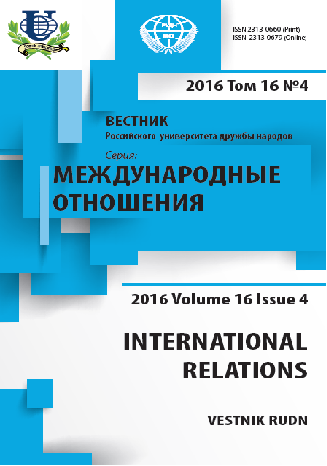India’s Role in the Emergence of Bangladesh as an independent state
- 作者: Drong A.1
-
隶属关系:
- Peoples' Friendship University of Russia (RUDN University)
- 期: 卷 16, 编号 4 (2016): Iran and India in the System of International Relations
- 页面: 736-744
- 栏目: Articles
- URL: https://journals.rudn.ru/international-relations/article/view/15446
- DOI: https://doi.org/10.22363/2313-0660-2016-16-4-736-744
如何引用文章
全文:
详细
This paper aims to describe the role of India, the biggest neighbor of Bangladesh, and the outmost support of the Soviet Union in the emergence of Bangladesh as an Independent State. The paper describes the background of the Bangladesh’s Liberation war in 1971. The political situation in East Pakistan just before the crisis is described in details, especially the results of general elections which were held in December 1970. A central part of the article is dedicated to the role of India and the contribution of Indian people, government and armed forces. Almost 10 million men and women were forced to leave Bangladesh and entered various states of India like West Bengal, Tripura, Assam, Meghalaya, Bihar and Uttar Pradesh where they were accommodated as refugees. The personal implication of Indira Gandhi was very high, she traveled around the world to gather support for the Bangladesh cause. India spent thousand of rupees for the liberation war of Bangladesh; but also sacrificed the lives of its officers and soldiers. Moreover, the paper touches upon the USSR’s involvement into the Liberation war of Bangladesh in context of Soviet-American rivalry during cold war.
作者简介
Andrio Drong
Peoples' Friendship University of Russia (RUDN University)
编辑信件的主要联系方式.
Email: adrong71@gmail.com
Moscow, Russia
参考
- Ashfaque, Hossain (2012). Liberation War, Emergence of Bangladesh and United Nations.
- Prothoma Prokashan.
- Independence of Bangladesh in 266 days (History and Documentary Evidence). Ed. Muhammad Nurul Quadir. Dhaka: Mukto Publishers, 2004.
- Salam, Azad. (2008). Role of Indian People in Liberation War of Bangladesh. Dialogue, 10 (2). URL: http://www.asthabharati.org/Dia_Oct%2008/sal.htm (accessed: 12.09.2016).








